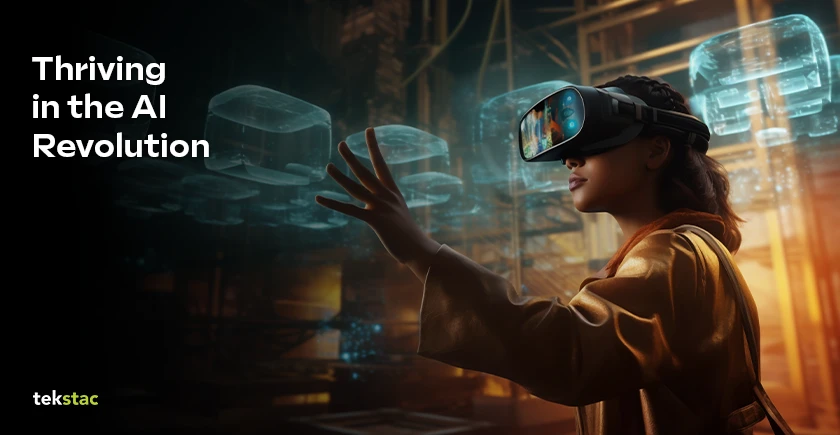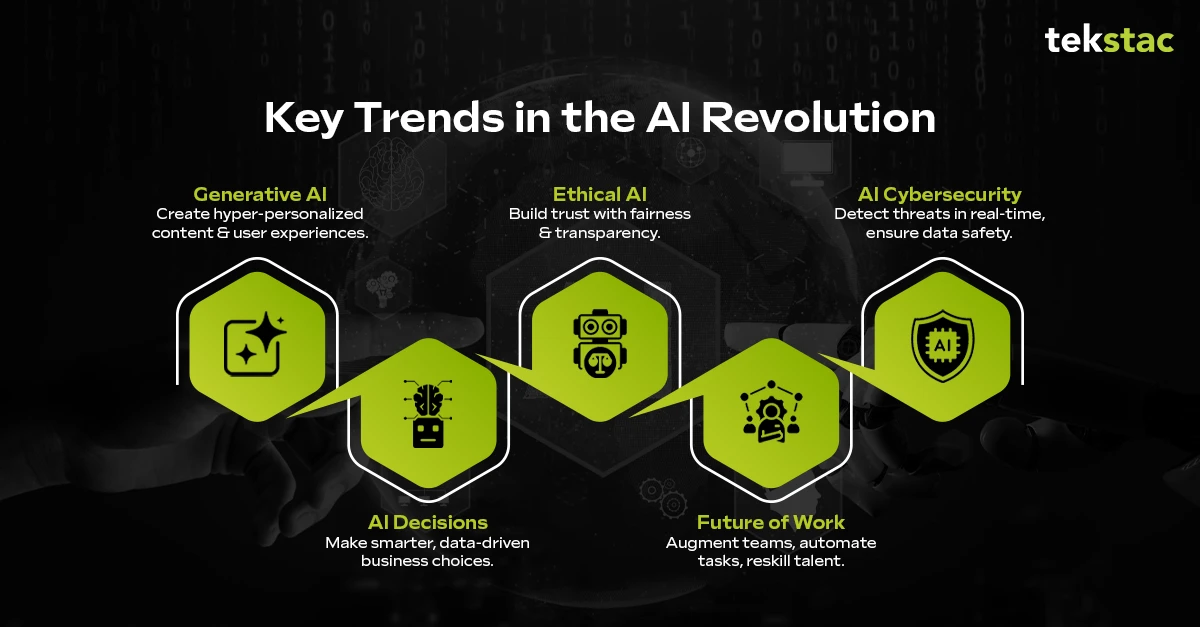How Startups Can Lead the AI Revolution and Drive the Next Wave of Innovation
May 13, 2025

Last updated on November 4th, 2025
We’re long past asking whether Artificial Intelligence (AI) matters, it’s now central to how industries operate and innovate. For startups, the AI revolution is both an opportunity and a challenge, a landscape filled with possibilities yet demanding strategic foresight. As we step into 2026, the question is not whether AI will shape the startup ecosystem, but how startups can harness AI revolution to carve a competitive edge.
AI Revolution as the Great Equalizer for Startups
For startups, AI levels the playing field. Unlike legacy enterprises burdened with outdated infrastructure, startups can adopt AI-first strategies from day one. Cloud computing, open-source models, and AI-powered automation allow small teams to compete with industry giants.
The democratization of AI tools means that even a two-person startup can deploy sophisticated machine learning models without extensive resources. AI is not just a tool, it is an enabler of innovation, efficiency, and scalability.
Key Trends Driving the AI Revolution in Startups

1.Generative AI Revolution: The Power of Personalization
AI is no longer just about automation; it’s about creativity. Startups leveraging the Generative AI revolution can build personalized user experiences, from custom marketing content to AI-driven product recommendations.
Businesses that prioritize AI-driven personalization will not only improve engagement but also foster deeper customer loyalty. Companies in e-commerce, media, and digital marketing will see a surge in AI-driven customization, allowing brands to speak directly to their audience’s needs- a key advantage in the ongoing AI revolution.
2. Smarter Decisions in the AI Revolution Era
Startups can harness AI for strategic insights, risk assessment, and predictive analytics. With AI-powered decision-making, founders can move beyond intuition and make data-backed choices, reducing failure rates and improving operational efficiency.
AI-driven business intelligence platforms are allowing startups to analyze vast amounts of market data, enabling them to pivot strategies with precision. From customer sentiment analysis to financial forecasting, AI-driven insights are becoming indispensable navigating the AI revolution.
3. Responsible AI: Ethics in the AI Revolution
As AI adoption grows, so does the need for ethical AI practices. Startups must prioritize transparency, fairness, and data security to build trust. Ethical AI will not just be a compliance requirement but a key differentiator in an increasingly scrutinized market.
Responsible AI practices, including bias mitigation and explainability, will be essential in maintaining credibility and securing long-term growth.
4. Responsible AI: Ethics in the AI Revolution
AI is reshaping workforce dynamics, automating repetitive tasks, and augmenting human intelligence. Startups that embrace AI-driven work models, such as AI-assisted customer support or intelligent project management, can enhance productivity without inflating operational costs.
AI’s integration into daily workflows will free up human potential, shifting the focus from repetitive execution to critical thinking and creativity. This transition underscores the urgent need for upskilling and reskilling, as the future of work will demand a blend of technical fluency and adaptive problem-solving.
5. Cybersecurity in the AI Revolution Landscape
As cyber threats become more sophisticated, startups must leverage AI for real-time threat detection and mitigation. AI-driven cybersecurity solutions will be essential in safeguarding sensitive data and ensuring business continuity. With increasing cyberattacks targeting small and mid-sized businesses, AI-powered security tools will become a necessity rather than a luxury.
Overcoming Startup Challenges in the AI Revolution
While AI offers unprecedented opportunities, startups must navigate key challenges:
1. Data Privacy & Compliance
AI thrives on data, but startups must ensure compliance with evolving regulations like GDPR, CCPA, and upcoming AI governance laws. Companies that proactively implement privacy-first AI strategies will be better positioned to build consumer trust and avoid regulatory penalties.
2. Talent Acquisition & Skill Gaps
AI expertise remains in high demand. Startups must invest in upskilling their teams or partner with AI specialists. Hiring data scientists and AI engineers can be expensive, making AI upskilling programs essential for non-technical teams. Platforms offering AI education and training will see growing adoption in startup ecosystems.
3. AI Bias & Fairness
Unchecked AI models can reinforce biases, leading to ethical concerns and reputational damage. Responsible AI development will be crucial for long-term credibility. Startups must ensure their AI algorithms are trained on diverse datasets and implement fairness checks to mitigate biases.
4. Cost of AI Implementation
While AI adoption is becoming more accessible, advanced AI solutions can still be expensive. Startups need to strike a balance between innovation and cost-effectiveness, leveraging AI-as-a-Service (AIaaS) platforms to deploy scalable AI solutions without hefty upfront investments.
Industries Leading the AI Revolution in 2026
AI is poised to revolutionize multiple industries, with startups leading the charge in:
- Healthcare: AI-powered diagnostics, drug discovery, and remote patient monitoring will drive efficiency and improve patient outcomes.
- Fintech: AI-driven fraud detection, robo-advisors, and algorithmic trading will redefine financial services.
- Retail & E-commerce: Personalized shopping experiences, AI-driven inventory management, and automated customer support will enhance consumer engagement.
- Education & EdTech: AI-powered adaptive learning platforms, personalized curriculums, and intelligent tutoring systems will reshape education.
- Logistics & Supply Chain: AI-powered demand forecasting, route optimization, and smart warehousing will enhance operational efficiencies.
“The next wave of startup innovation will be powered by AI that learns, adapts, and scales alongside human creativity.”
— Google Cloud, Future of AI: Perspectives for Startups 2025
The Road Ahead: Thriving in the AI Revolution
The future of AI in startups is not just about technology, it’s about vision, adaptability, and responsible innovation. Startups that leverage AI strategically, prioritize ethical considerations, and embrace continuous learning will be the frontrunners of the AI revolution.
AI is the new frontier, and startups that embrace it will define the next decade of innovation. Whether it’s optimizing operations, improving customer experiences, or driving product innovation, AI is no longer optional, it’s essential.
As AI continues to evolve, startups have a unique advantage: agility. In a world where AI-powered disruption is the norm, the most successful startups will be those that stay ahead of the curve, embrace AI-driven transformation, and reimagine what’s possible in the digital age.
Will your startup be a disruptor or a follower in the AI era? The choice is yours.
Based on insights from Google Cloud’s ‘The Future of AI: Perspectives for Startups 2025′ report.
FAQs on AI Revolution
1. What is the AI revolution?
The AI Revolution refers to the rapid adoption of artificial intelligence across industries, transforming how businesses innovate, automate, and make data-driven decisions. It marks a shift toward smarter, more efficient digital ecosystems.
2. How can startups benefit from the AI Revolution in 2026?
Startups can leverage the AI Revolution to scale faster, personalize customer experiences, optimize operations, and gain a competitive edge through data intelligence and automation-driven innovation.
3. What challenges do startups face in the AI Revolution?
The main challenges include AI talent shortage, cost of implementation, ethical risks, and data privacy compliance.
4. Who will survive the AI Revolution?
Organizations that adapt quickly, invest in AI skills, and embrace ethical, data-driven innovation will thrive. Startups and businesses that blend human creativity with AI intelligence will lead to the future.





